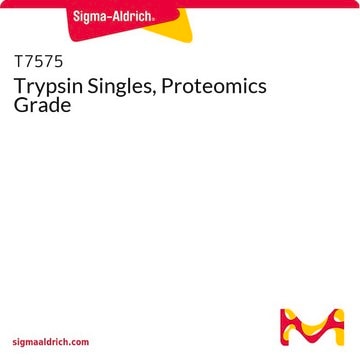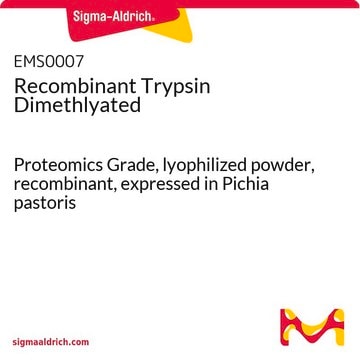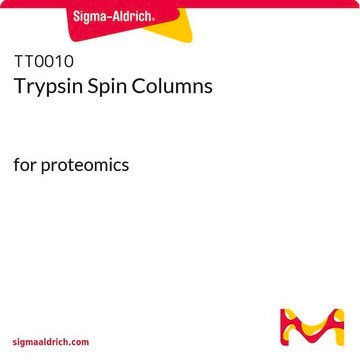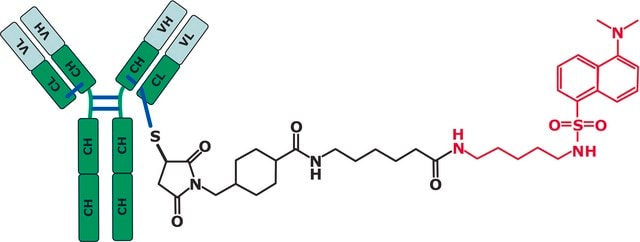Kluczowe dokumenty
EMS0004
SOLu-Trypsin
recombinant, expressed in Pichia pastoris, Proteomics Grade, liquid
Synonim(y):
Gotowa do użycia rekombinowana trypsyna do trawienia białek w spektrometrii masowej, Rekombinowana trypsyna do trawienia białek w spektrometrii masowej, Trypsyna do trawienia białek, rTrypsyna
Wybierz wielkość
347,00 zł
Wybierz wielkość
About This Item
347,00 zł
Polecane produkty
Opis ogólny
Zastosowanie
Działania biochem./fizjol.
- SOLu-Trypsin (EMS0004) is our exclusive, Advanced Proteomics Grade enzyme that is solution-stable for mass spectrometry.
- Designed to be stable in solution when refrigerated, SOLu-Trypsin can be used immediately without preparation.
- Other forms of trypsin require thawing or reconstitution, and must be discarded if not used immediately.
- SOLu-Trypsin allows excess product to be saved for future use, thus eliminating unnecessary waste and cost.
- It is formulated with a high-purity recombinant trypsin, free of chymotryptic activity, to ensure high fidelity digestion.
Cechy i korzyści
- Ready to use - no preparation, such as reconstitution or thawing, is required
- Fits seamlessly into established workflow - no need to modify protocols
- Eliminates waste - remains stable in the refrigerator after use so there is no need to discard excess product
- Recombinant, porcine sequence - no chymotryptic activity
- Stable for short-term use at room temperature in an autosampler or on a liquid handling robot
Kod klasy składowania
10 - Combustible liquids
Klasa zagrożenia wodnego (WGK)
WGK 1
Temperatura zapłonu (°F)
Not applicable
Temperatura zapłonu (°C)
Not applicable
Wybierz jedną z najnowszych wersji:
Certyfikaty analizy (CoA)
Nie widzisz odpowiedniej wersji?
Jeśli potrzebujesz konkretnej wersji, możesz wyszukać konkretny certyfikat według numeru partii lub serii.
Masz już ten produkt?
Dokumenty związane z niedawno zakupionymi produktami zostały zamieszczone w Bibliotece dokumentów.
Klienci oglądali również te produkty
Produkty
Evaluation of Recombinant, Chemically Treated Trypsin in Proteomics and Protein Characterization Assays
Pretreatment with Mucinase StcE increases glycopeptide identification from mucin samples, enhancing sample preparation efficiency for glycopeptide analysis.
An optimized peptide mapping protocol using NISTmAb as a model monoclonal antibody, shorter incubation times, and improved digestion buffer to demonstrate minimal artificial asparagine deamidation and methionine oxidation.
Zestaw do szybkiego trawienia trypsyną zapewnia wiarygodne wyniki analizy spektrometrii masowej w czasie krótszym niż 2 godziny.
Protokoły
An optimized LC-MS/MS based workflow for low artifact tryptic digestion and peptide mapping of monoclonal antibody, adalimumab (Humira) using filter assisted sample preparation (FASP).
Powiązane treści
Find protein research tools to prepare, isolate, and analyze proteins. Organized by how to extract, protect, purify, enrich, modify, and quantify proteins.
Active Filters
Nasz zespół naukowców ma doświadczenie we wszystkich obszarach badań, w tym w naukach przyrodniczych, materiałoznawstwie, syntezie chemicznej, chromatografii, analityce i wielu innych dziedzinach.
Skontaktuj się z zespołem ds. pomocy technicznej